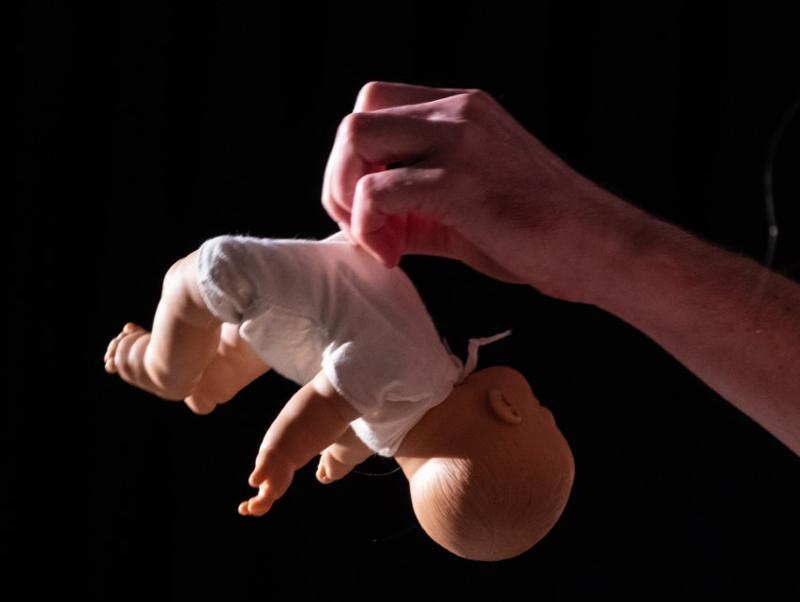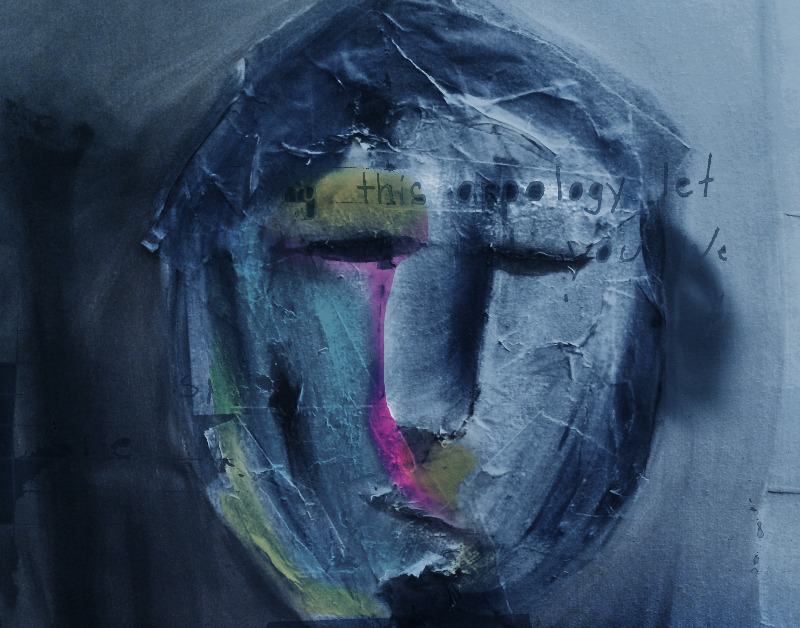Edinburgh Fringe 2022 reviews: Boy / Intruder|Intruz | reviews, news & interviews
Edinburgh Fringe 2022 reviews: Boy / Intruder|Intruz
Edinburgh Fringe 2022 reviews: Boy / Intruder|Intruz
Two shows at Summerhall explore issues of identity - though with contrasting outcomes

Boy, Summerhall ★★★★
Nature or nurture? It’s the perennial question behind so much in human development – and the central issue, too, behind Carly Wijs’s very moving Boy for Flemish theatre company De Roovers at Summerhall.
Twins Brian and Bruce had to endure intimate surgery as babies – an experimental procedure that, when it goes wrong, leaves Bruce as Brenda. At least that’s outcome advised by a Harvard-educated quack, who assures the aghast mother and father that, with sufficient hormones and parental guidance, he really will become a girl.
Wijs tackles one of the most divisive issues of our current times, but she does so with admirable equanimity, and loads of compassion too. This is the writer/director, after all, that retold the 2004 Beslan school seige as a family show to huge acclaim in 2016. Crucially, actors Vanja Maria Godee and Jeroen Van der Ven deliver their at times harrowing, appalling story with disarming tenderness, understanding, even wit.
After layer upon layer of subterfuge are revealed in Godee and Van der Ven’s ever more complex (and credibility-challenging) tale, what finally emerges is a reflection on the stories we tell, the memories we create, and how they come to define our actions and reactions, no matter how truthful they are. And as such, Boy’s ultimate message of hope and resilience – well, partially, at least – might be just what we need to hear.
 Intruder|Intruz, Summerhall ★★★
Intruder|Intruz, Summerhall ★★★
It’s not generally a wise idea to disconcert your audience. And frankly, the fact that Remi Rachuba’s autobiographical solo show Intruder/Intruz code-switches restlessly between English and Polish is only one of its issues. Its narrative switchbacks between high-class Warsaw casino openings and grimy Glasgow alleys, and jumps back and forth too between Rachuba’s early years in Poland and his current life in Scotland.
His fragmented narrative and his bilingual delivery, while not obscuring things entirely, generates a kind of stream-of-consciousness, let-it-all-wash-over-you effect where you’re constantly grasping at meaning, only to have it slip out of your hands. Which is all the more frustrating, because Rachuba clearly has plenty to say – about a violent attack that leaves him apparently permanently scarred psychologically, and his struggles to find reconciliation and redemption.
It’s a great shame, because Rachuba is such a magnetic, charismatic performer, leaping nimbly between characters and settings, and delivering his tale with abundant energy and commitment. There’s loads of potential here – for a dissection of the immigrant experience, maybe, or of discovering a new sense of self-confidence after trauma. It’s all there, embedded within Rachuba’s dense, fast-moving narrative – it’s just that currently, it’s all a bit hard to pick apart.
The future of Arts Journalism
You can stop theartsdesk.com closing!
We urgently need financing to survive. Our fundraising drive has thus far raised £49,000 but we need to reach £100,000 or we will be forced to close. Please contribute here: https://gofund.me/c3f6033d
And if you can forward this information to anyone who might assist, we’d be grateful.

Subscribe to theartsdesk.com
Thank you for continuing to read our work on theartsdesk.com. For unlimited access to every article in its entirety, including our archive of more than 15,000 pieces, we're asking for £5 per month or £40 per year. We feel it's a very good deal, and hope you do too.
To take a subscription now simply click here.
And if you're looking for that extra gift for a friend or family member, why not treat them to a theartsdesk.com gift subscription?
more Theatre
 Cow | Deer, Royal Court review – paradox-rich account of non-human life
Experimental work about nature led by Katie Mitchell is both extraordinary and banal
Cow | Deer, Royal Court review – paradox-rich account of non-human life
Experimental work about nature led by Katie Mitchell is both extraordinary and banal
 Deaf Republic, Royal Court review - beautiful images, shame about the words
Staging of Ukrainian-American Ilya Kaminsky’s anti-war poems is too meta-theatrical
Deaf Republic, Royal Court review - beautiful images, shame about the words
Staging of Ukrainian-American Ilya Kaminsky’s anti-war poems is too meta-theatrical
 Laura Benanti: Nobody Cares, Underbelly Boulevard Soho review - Tony winner makes charming, cheeky London debut
Broadway's acclaimed Cinderella, Louise, and Amalia reaches Soho for a welcome one-night stand
Laura Benanti: Nobody Cares, Underbelly Boulevard Soho review - Tony winner makes charming, cheeky London debut
Broadway's acclaimed Cinderella, Louise, and Amalia reaches Soho for a welcome one-night stand
 The Pitchfork Disney, King's Head Theatre review - blazing with dark energy
Thrilling revival of Philip Ridley’s cult classic confirms its legendary status
The Pitchfork Disney, King's Head Theatre review - blazing with dark energy
Thrilling revival of Philip Ridley’s cult classic confirms its legendary status
 Born with Teeth, Wyndham's Theatre review - electric sparring match between Shakespeare and Marlowe
Rival Elizabethan playwrights in an up-to-the-minute encounter
Born with Teeth, Wyndham's Theatre review - electric sparring match between Shakespeare and Marlowe
Rival Elizabethan playwrights in an up-to-the-minute encounter
 Interview, Riverside Studios review - old media vs new in sparky scrap between generations
Robert Sean Leonard and Paten Hughes make worthy sparring partners
Interview, Riverside Studios review - old media vs new in sparky scrap between generations
Robert Sean Leonard and Paten Hughes make worthy sparring partners
 Fat Ham, RSC, Stratford review - it's Hamlet Jim, but not as we know it
An entertaining, positive and contemporary blast!
Fat Ham, RSC, Stratford review - it's Hamlet Jim, but not as we know it
An entertaining, positive and contemporary blast!
 Juniper Blood, Donmar Warehouse review - where ideas and ideals rule the roost
Mike Bartlett’s new state-of-the-agricultural-nation play is beautifully performed
Juniper Blood, Donmar Warehouse review - where ideas and ideals rule the roost
Mike Bartlett’s new state-of-the-agricultural-nation play is beautifully performed
 The Gathered Leaves, Park Theatre review - dated script lifted by nuanced characterisation
The actors skilfully evoke the claustrophobia of family members trying to fake togetherness
The Gathered Leaves, Park Theatre review - dated script lifted by nuanced characterisation
The actors skilfully evoke the claustrophobia of family members trying to fake togetherness
 As You Like It: A Radical Retelling, Edinburgh International Festival 2025 review - breathtakingly audacious, deeply shocking
A cunning ruse leaves audiences facing their own privilege and complicity in Cliff Cardinal's bold theatrical creation
As You Like It: A Radical Retelling, Edinburgh International Festival 2025 review - breathtakingly audacious, deeply shocking
A cunning ruse leaves audiences facing their own privilege and complicity in Cliff Cardinal's bold theatrical creation
 Edinburgh Fringe 2025 reviews: Refuse / Terry's / Sugar
A Ukrainian bin man, an unseen used car dealer and every daddy's dream twink in three contrasting Fringe shows
Edinburgh Fringe 2025 reviews: Refuse / Terry's / Sugar
A Ukrainian bin man, an unseen used car dealer and every daddy's dream twink in three contrasting Fringe shows
 Faustus in Africa!, Edinburgh International Festival 2025 review - deeply flawed
Bringing the Faust legend to comment on colonialism produces bewildering results
Faustus in Africa!, Edinburgh International Festival 2025 review - deeply flawed
Bringing the Faust legend to comment on colonialism produces bewildering results

Add comment